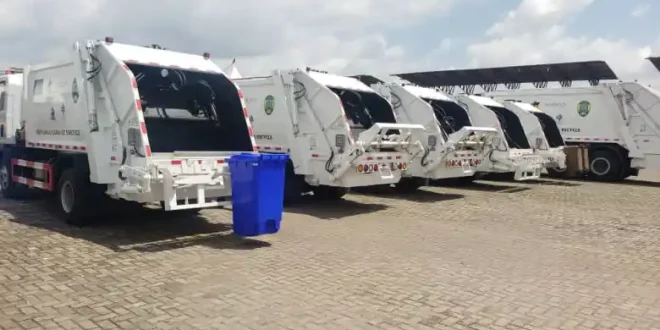
City authorities in Kumasi have announced an ambitious project to deal with filth and also to create jobs.
Authorities say the Holistic Reinforcement for Sustainable Development (HORESD) programme also aims at restoring the Ashanti regional capital to its former glory as “The Garden City”.
A staggering 70% of revenue generated by city authorities in Kumasi is allocated to sanitation management, putting tremendous pressure on the city’s finances. Authorities are, however, stepping up to the challenge to generate more revenue for other sectors.
The Holistic Reinforcement for Sustainable Development (HORESD) programme goes beyond cleaning up Kumasi; it’s about reimagining the city’s environmental landscape.
Launching the project, Samuel Pyne, the Mayor of Kumasi said, “We have eight brand new trucks for this project, a thousand-unit containers. We have facilitation of aggregators to purchase recyclable materials from waste pickers. We will have four compost sites within the city and two mini recycling plants to take charge of the waste produced.”
“And this is going to create jobs for the people and also give resources to KMA to enable us to pursue our developmental Agenda”, he added.
Pyne said, fees will be charged on collection of the waste to sustain the initiative with maintenance of tracks and payment of waste collectors.
He is urging residents to support this initiative to rid the city of filth.
The project, funded by the European Union is in partnership with Cape Verde and Manra of Spain, the city of Valencia. Head of Cooperation, European Union Delegation, Massimo Mina, said monitoring systems have been instituted to monitor the progress of the initiative and ensure its sustainability.
Authorities have already started an extensive campaign in the Adum area, aiming to engage the community actively in the fight against litter in the city. Some members of the public within the Central Business District have lauded the KMA for this intervention.
“We believe that if the KMA successfully implements this project, it will significantly reduce the level of filth in our market. The filth problem isn’t solely caused by traders; passers-by and buyers also contribute to it. Some buyers thoughtlessly discard used sachets and other waste in the market.
“Others intentionally package their refuse in plastic bags and strategically place them near traders while making their purchases. Paying a small fee of GHC2 for access to dustbins during a full day of business is reasonable and fair. It is a positive and normal practice,” a trader said.
“Maintaining the market’s cleanliness through the introduction of bins is a positive step, but to ensure its success, there must be vigilant supervisors stationed near these bins. Unfortunately, some individuals may have a disregard for proper waste disposal practices. Even with the bins available, they might still opt to litter on the ground, which would defeat the purpose of the KMA’s efforts”, another added.
The initiative starts on Wednesday, 1 November.
Source: Asaaseradio.com
 Home Of Ghana News Ghana News, Entertainment And More
Home Of Ghana News Ghana News, Entertainment And More




